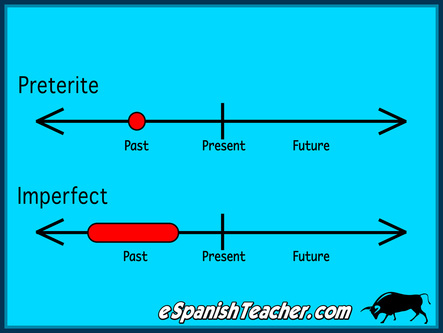|
How can I better understand the Imperfect vs. Preterite verb forms in Spanish? This is perhaps the most common question I get as a Spanish teacher. Let me take some time to clear up the confusion and help establish the meaning and uses of the two. Think about preterite as the simplest form of the past tense, such as "We ate lunch" or "she repaired the door". The emphasis in these two statements is that the verb (the action) occurred in the past, it happened relatively quickly, and now it's over. In fact, many times you will use the preterite verb tense when you want to emphasize that your action is over or not happening anymore. If you were to imagine a timeline with a single dot for the present, actions that happen in the preterite would be a similar dot on a timeline, but in the past (to the left of the present). Ok, now that we have established that the preterite is a single instance (a single dot) that took place in the past, lets now look at the imperfect. Instead of a single dot on a timeline, the imperfect is best represented by a span of time in the past. So it looks more like a mini timeline that happens in the past. If that's confusing, think back to our timeline and the dot that represents the present. To the left of that dot is the past. As opposed to a dot like we used for the preterite, the imperfect is best represented by a shorter line that represents a span of time in the past. People often use the imperfect when relating an event that happened in the past. Two examples are "We were eating..." or "She was repairing the door..." Both examples are happening in the past, but they are part of an event that lasts longer than a single instant. When you use the imperfect, you're not necessarily trying to emphasize that the action is already complete like you are when you use the preterite. With the preterite, the action is complete, it's over, and you are emphasizing the fact that it's finished. "We ate lunch" or "She repaired the door". Here is one final example that uses both forms that may help you understand: "We were eating lunch when suddenly the bell rang." We were eating = Imperfect the bell rang = Preterite Notice that this sentence is actually telling a story (or an event). First, you set up the story by saying "we were eating lunch". This is a perfect example of the imperfect. Then you finish the story with "the bell rang". The bell ringing is a perfect example of the preterite because it happened and now it's over. One more: "She was watching TV when the man screamed." "she was watching" = imperfect (setting up the story or event) "the man screamed" = preterite (it happened and now it's over) Before I go, there is one more use of the imperfect that you should know. If you ever did anything with regularity, that would be imperfect. I call this the "used to..." rule. For example, "I 'used to' run 3 miles every day". or "We would eat dinner together every night". Again you are telling a story of an event that happened with regularity over a length of time, but still in the past. |
AuthorThis is where we chat about all things Spanish. Feel free to ask a question, challenge me, passionately disagree, or rant about whatever. Just make it interesting. Archives
August 2018
Categories
All
|


 RSS Feed
RSS Feed
